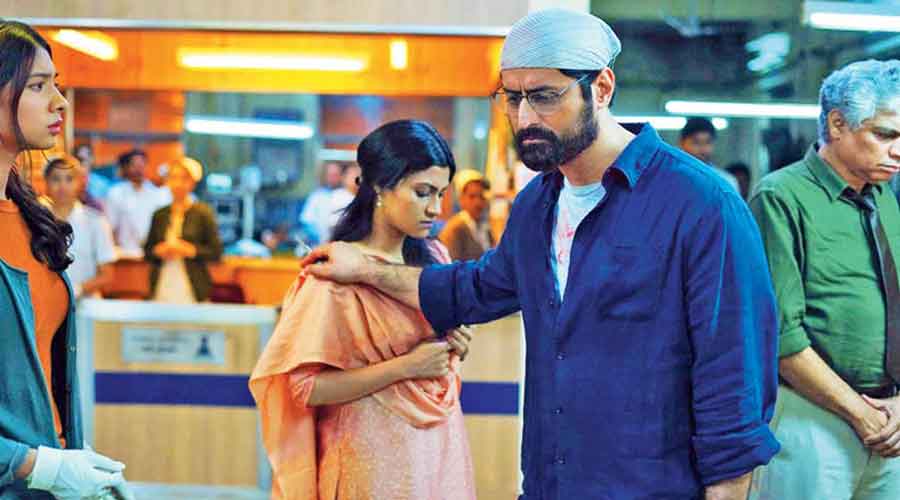Quite often, narratives — especially if they are thrillers — are overstuffed with a certain busyness to indicate that something is constantly happening on screen. Most of it feels redundant, as if the writers are plugging plot holes with an action sequence here, a cliffhanger there, so that the audience doesn’t feel cheated, so to speak.
In Mumbai Diaries 26/11, chaos is an integral part of the narrative. In fact, it defines the tone and texture of this eight-part series, now streaming on Amazon Prime Video. Built around the November 26, 2008 terrorist attack, which brought Mumbai to its knees but failed to crush its spirit, creator-director Nikkhil Advani meshes fact with fiction. The shootout at Leopold Cafe and CST Station are shown in passing, a part of the narrative brings alive the attack on the Taj — renamed The Palace Hotel here — but the major action takes place at the Bombay General Hospital where the victims are wheeled in.
That gives Advani and his co-director Nikhil Gonsalves the liberty to split the dramatised narrative into two layers — one which shows the hospital’s dedicated but severely understaffed medical personnel, buried beneath years of bureaucracy and a dysfunctional medical system, pull out all the stops to treat the injured. The other displays their courage under fire when the hospital itself becomes one of the targets of the attack. What results is a largely nail-biting, often horrific look at the attack from the point of view of frontline workers and first responders.
Both skill and temperament are put to the test at Bombay General Hospital when the injured start piling up. It’s the first day at work for three earnest but wet-behind-the-ears resident doctors and possibly one of the last for their new boss. Kaushik Oberoi (Mohit Raina, in fine form), the head of trauma care at the crumbling hospital, often doesn’t play by the book, his unorthodox ways of treatment coming in for severe criticism, but given how brilliant he is at his job, his non-conformism is often overlooked by the hospital administration. But then, he is preparing to move on. Then there is Chitra Das (Konkona Sensharma, understated yet effective), a somewhat voiceless part of the hospital’s system whose backstory — marital abuse as well as career setback — makes her one of the most empathetic characters in this story.
The two may be the principal players in Mumbai Diaries 26/11, but it’s the show’s strong ensemble cast — almost every character, irrespective of screen time, is fleshed out well — which makes it a gripping and often moving watch. Even while the action unfolds predominantly at the hospital, a part of the story finds focus at the posh five-star hotel nearby where another account of unflinchig bravery is played out. Ananya Ghosh (Tina Desai), a manager at the hotel, goes beyond the call of duty to guide her guests to safety. The professional meets the personal, with Ananya being married to Kaushik Oberoi and one of the resident doctors (Diya, played by Natasha Bharadwaj) having her parents under siege at the hotel.
The 26/11 story has been told in various forms and through different standpoints. In Mumbai Diaries 26/11, we not only get a fresh perspective, but also underlying threads that touch upon casteism, nepotism, mental and physical abuse, bigotry and so on. Not all of it lands well. Parts of Mumbai Diaries 26/11 slip into the overdramatic and the terrible Bangla accent (an unneccesary part of the narrative), undoes some of the good work, but the power of the human spirit and the poignancy of putting others before self is what makes this series work.
What we also liked is how the series effectively addresses what being a medical worker actually means. “We’re doctors, sir. We care for the human body. Judging the human character is not our job,” Oberoi says at one point when he is hauled up for resuscitating one of the terrorists. Those words stay with you.
While almost everyone finds redemption in some form or the other at the end, what the show gives short shrift to is the media, which is consistently portrayed as a gang of vultures. Shreya Dhanwanthary’s newshound adopts unethical means to get that infamous ‘breaking story’, but this is a story that offers her character no layers or redemption.
But once the all-out action sets in from Episode 6, you, as the viewer, scarcely have time to think. You have your heart in your mouth and your nails between your teeth, with the end both bringing on howl and hurrah. And once the screen goes blank, you can’t help but think long and hard about those who endured those dark days and nights first-hand, staring death in the face but willing themselves to live. Truth is always braver than fiction.
I liked/ didn’t like Mumbai Diaries 26/11 because.... Tell t2@abp.in
